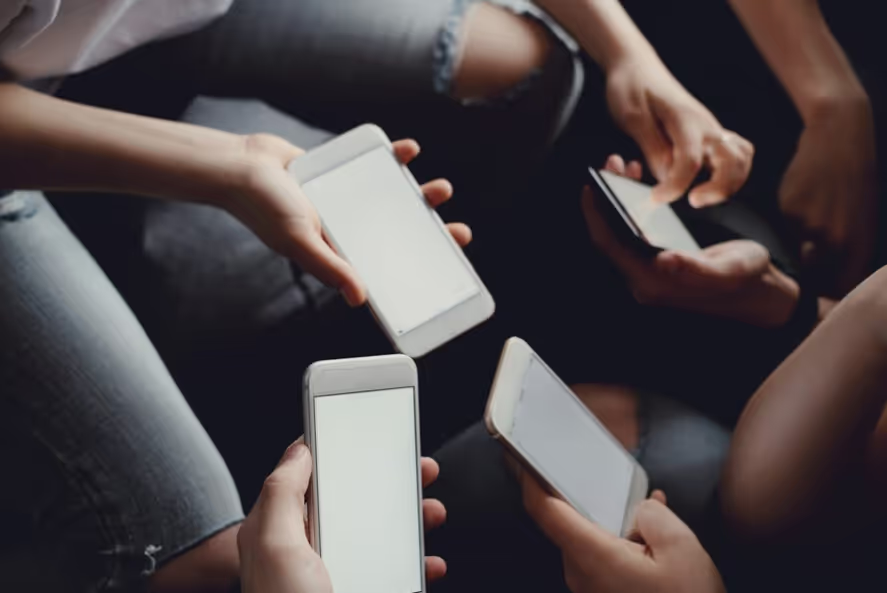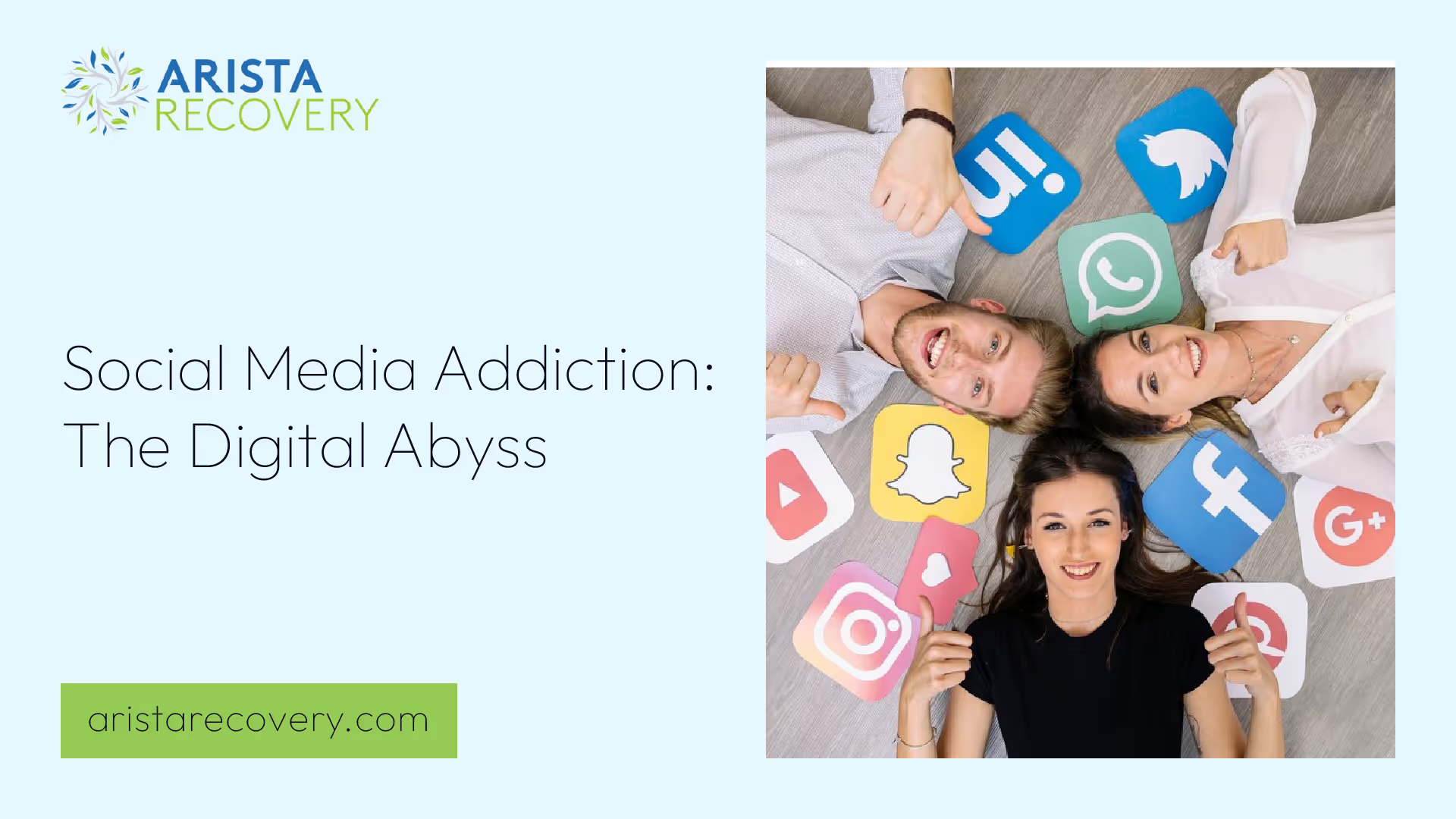Social Media Addiction: The Digital Abyss

Understanding Social Media Addiction
In the digital age, where social media platforms play a significant role in our lives, it's important to understand the concept and implications of social media addiction. Let's delve into the definition, symptoms, prevalence, and demographics of this contemporary issue.

Definition and Symptoms
Social media addiction is a recognized mental health disorder characterized by excessive and compulsive use of social media platforms, leading to negative impacts on an individual's mental health, relationships, and daily functioning. It is a behavioral addiction described as being overly concerned about social media, driven by an uncontrollable urge to use it, and leading to negative consequences.
This addiction can have serious negative consequences, such as poor mental health, including anxiety, depression, loneliness, and even suicidal thoughts [2]. Individuals struggling with it should seek help from mental health professionals or addiction treatment centers.
Prevalence and Demographics
Rates of social media addiction are increasing each year. According to research from the University of Michigan, approximately 210 million people worldwide suffer from addiction to social media and the internet.
In terms of demographics, young social media users aged 18 to 22 account for a surprising 40% of all Americans addicted to social media [3].
The issue of social media addiction is a growing concern, with the number of people aged 18 to 44 who were unable to take a break from social media more than doubling from 2014 to 2019.
Understanding the prevalence and demographics of social media addiction is crucial in developing effective prevention and treatment strategies that cater to the needs of different age groups and genders. This knowledge can also help individuals become more aware of their social media usage and take the necessary steps to maintain a healthy digital life.
The Science Behind Addiction
To understand the pervasive grip of social media addiction, it's crucial to delve into the science behind it. This section elucidates the role of dopamine and reward systems in addiction and compares social media addiction with other forms of addictive behaviors.
Dopamine and Reward Systems
The addictive nature of social media is reinforced by the activation of the brain's reward center through the release of dopamine, a "feel-good chemical" McLean Hospital. This phenomenon is linked to pleasurable activities like sex, food, and social interactions.
The constant access to social media, notifications, and updates can create a reward system that leads to compulsive checking and prolonged periods of use HelpGuide. Social media platforms are intentionally designed to be addictive, leveraging instant gratification and dopamine release associated with likes, comments, and shares on posts Social Media Victims.
Furthermore, the addictive nature of social media is reinforced by the uncertainty of outcomes, akin to the mechanisms of a slot machine. Users are enticed to engage with these platforms due to the unknown nature of outcomes such as likes on a picture, creating an addictive cycle of checking for social validation and potential rewards McLean Hospital.
Comparison with Other Addictions
When compared with other forms of addiction, research has shown that social media can trigger an addictive reaction in the brain similar to the response elicited by substance abuse HelpGuide. This comparison underscores the seriousness of social media addiction and the need for effective strategies to manage and mitigate its harmful effects.
According to a survey conducted by Common Sense Media in 2019, eight-to-twelve-year-olds in the U.S. spent an average of 4 hours and 44 minutes a day on screens GoodRx. The harmful effects of this addiction include disrupted sleep patterns, decreased academic performance, online harassment, and an increased risk for depression and anxiety GoodRx.
Research from the Journal of Abnormal Psychology in 2019 found that adolescents who spend more than three hours a day on social media have an increased risk of mental health problems compared to those who use screens less frequently GoodRx. This illustrates the parallel between social media addiction and other forms of addiction, highlighting the importance of addressing this growing concern.
The Impact on Mental Health
The implications of social media addiction extend beyond the digital world, and its effects on mental health are increasingly becoming a cause for concern. The relationship between social media use and mental health disorders such as anxiety and depression, as well as its impact on sleep quality and physical health, are areas of focus in current research.
Anxiety and Depression
Social media addiction has been linked to an increase in feelings of anxiety and depression. Research from San Diego State University shows that teens who spend over 5 hours on social media are at a higher risk of committing suicide Addiction Help. Furthermore, a 2019 study from the Journal of Abnormal Psychology found that adolescents who spend more than three hours a day on social media have an increased risk of mental health problems compared to those who use screens less frequently GoodRx.
On platforms like Instagram, issues of comparison and hurt feelings persist, even with measures like suppressing likes. These underlying concerns can significantly impact mental health McLean Hospital.
Sleep Quality and Physical Health
The use of social media can lead to disrupted and decreased sleep patterns. Poor sleep is linked to depression, memory loss, and poor academic performance McLean Hospital.
The mind-gut connection can turn anxiety and depression stemming from social media use into physical symptoms like nausea, headaches, muscle tension, and tremors McLean Hospital.
In summary, the mental health impact of social media addiction is significant and can lead to both psychological and physical symptoms. Recognizing these potential effects is an important step in addressing and managing the issue of social media addiction.
Consequences on Daily Living
As the digital world becomes increasingly intertwined with our daily lives, the effects of social media addiction extend far beyond the confines of the screen. This pervasive dependency can significantly disrupt our academic or work performance and personal relationships, leading to a range of physical and emotional consequences.
Academic and Work Performance
Individuals addicted to social media often find themselves neglecting their responsibilities at school or work. This preoccupation with online platforms can result in a decline in performance and productivity, as they divert their time and energy away from their academic or professional tasks.
The harmful effects of social media addiction include disrupted sleep patterns, decreased academic performance, and an increased risk for depression and anxiety, which can further hinder one's ability to focus and perform.
Research from the Journal of Abnormal Psychology in 2019 found that adolescents who spend more than three hours a day on social media have an increased risk of mental health problems compared to those who use screens less frequently. These mental health issues can further affect their concentration and academic performance.
Personal Relationships
Social media addiction can also take a toll on personal relationships. The excessive time spent online often comes at the expense of face-to-face interactions, leading to feelings of isolation and disconnection. Furthermore, the constant bombardment of idealized images and narratives can foster unrealistic expectations, leading to dissatisfaction and conflicts in relationships.
In severe cases, social media addiction can lead to the breakdown of relationships, as individuals become more engrossed in their digital lives at the expense of their real-world connections.
In conclusion, the ramifications of social media addiction extend far beyond the digital realm, permeating various aspects of our daily lives. By recognizing these potential consequences, individuals can take proactive steps to mitigate the effects of this digital dependency.
Popular Platforms and Their Effects
The influence and effects of social media on our lives are undeniable, given its ubiquitous presence in our day-to-day activities. When it comes to social media addiction, it's important to understand the role of different platforms and their potential impacts.
YouTube and Facebook
YouTube and Facebook are the most used online platforms, with a significant number of users spending much of their online time on these platforms [3]. A Gallup survey on U.S. teenagers' social media habits revealed that YouTube is a dominant platform among teens, with users spending an average of 1.9 hours daily.
While these platforms offer a wealth of informative, entertaining, and social content, excessive use can lead to negative impacts such as mental health issues, sleep disturbances, and poor academic performance among adolescents and young adults [5].
Instagram and TikTok
Instagram and TikTok are other popular platforms, especially among younger demographics. The same Gallup survey indicates that TikTok is a favorite among teens, with users spending an average of 1.5 hours daily, while Instagram lags at 0.9 hours.
Multiple studies have indicated that high usage of social media platforms like Instagram and TikTok can lead to increased feelings of isolation and loneliness in users.
The average person spends around 144 minutes per day on social media, equating to over five years of their life spent on these platforms. This high level of usage, coupled with the potential for negative emotional responses, underscores the importance of understanding and addressing social media addiction.
Understanding the potential impacts of various platforms can help users make informed decisions about their social media habits. The key lies in finding a balance and ensuring that social media use doesn't interfere with one's mental health, personal relationships, and daily functioning.
Treatment and Prevention Methods
Addressing social media addiction requires both professional interventions and self-help strategies. These methods aim to establish healthier relationships with technology, and vary in intensity depending on the severity of the addiction.
Professional Help and Resources
Professional treatments for social media addiction may include cognitive-behavioral therapy (CBT), counseling sessions focused on building healthy coping mechanisms and establishing boundaries with technology usage. There are also support groups like Social Media Anonymous (SMA), and in severe cases, digital detox programs or rehab centers specializing in internet addictions can be beneficial [1].
For children and adolescents, early intervention and parental involvement are key. The American Academy of Pediatrics recommends that children aged 2 to 5 years should be limited to one hour of screen time a day, and older children should be using screens for educational purposes only. Parents should monitor their child's online activity, establish clear guidelines and limits on usage, and educate them about the potential risks associated with excessive social media use [1].
Self-Help Strategies and Tips
Coupled with professional help, self-help strategies can significantly aid in managing social media addiction. An effective approach introduced by the Harvard Business Review is "Structured Social Media". This involves intentional and sparing use of social media, allowing individuals to maintain relationships and keep up with important events without the negative effects of overuse.
This might involve scheduling specific times during the day to check social media and limiting use to those times. By setting a designated time for certain activities, individuals can detach from the constant need to be online, thereby gaining better control over their social media habits. This approach has been found to reduce negative effects like anxiety and FOMO (Fear Of Missing Out).
In some cases, a drastic measure like quitting social media cold turkey may be effective. However, a gradual reduction in usage or seeking professional help may be more suitable options depending on the individual's situation and needs, as abrupt cessation can lead to withdrawal symptoms or feelings of isolation.
By combining professional interventions with self-help strategies, individuals struggling with social media addiction can create a balanced digital lifestyle and improve their overall mental well-being.
References
[1]: https://www.niagararecovery.com/blog/social-media-addiction-statistics
[2]: https://www.addictioncenter.com/drugs/social-media-addiction/
[3]: https://www.addictionhelp.com/social-media-addiction/statistics/
[4]: https://www.goodrx.com/well-being/behavioral-addiction/addicted-to-social-media
[5]: https://providenceproject.org/resource-hub/tips-for-preventing-social-media-addiction/
[6]: https://markwschaefer.medium.com/whos-responsible-for-social-media-addiction-me-and-you-117970aac047
You’re not alone in this.
When mental health challenges and addiction intersect, it can feel isolating. At Arista, we offer compassionate, evidence-based, and trauma-informed care to help you heal, grow, and move forward.
You’re not alone in this.
When mental health challenges and addiction intersect, it can feel isolating. At Arista, we offer compassionate, evidence-based, and trauma-informed care to help you heal, grow, and move forward.
Support that moves with you.
You’ve taken a brave first step. At Arista Recovery, we’re here to help you continue with best-in-class care designed for long-term healing and support.
.webp)






